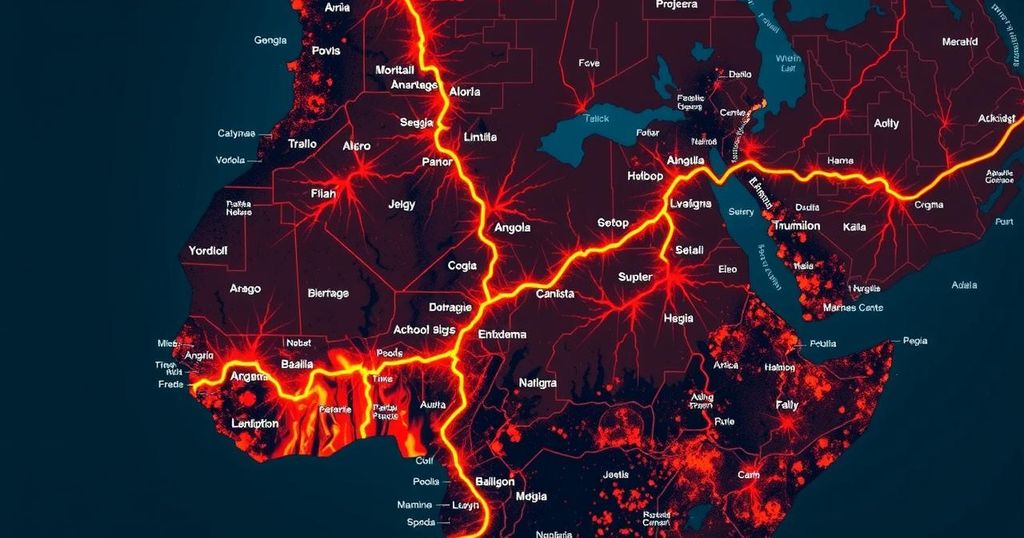Companies
AFRICA, ASIA, ATLANTIC OCEAN, BID, CHINA, DEMOCRATIC REPUBLIC OF CONGO, DEPARTMENT OF STATE, ENERGY, ENERGY TRANSITION, GROUP OF SEVEN, HE, HELAINA MATZA, JOAO LOURENCO, JOE BIDEN, MEXICO, MINING, NORTH AMERICA, PARTNERSHIP FOR GLOBAL INFRASTRUCTURE AND INVESTMENT, PGI, RENEWABLE ENERGY, U. S. DEPARTMENT OF STATE
Fatima Khan
0 Comments
Biden’s Visit to Angola: Spotlighting the Lobito Corridor as a Counter to China
President Joe Biden will promote the Lobito Corridor during his Angola visit in December, highlighting this $5 billion infrastructure project designed to counter China’s influence in Africa. Set to enhance supply chains for critical minerals, the corridor aims to revitalize transportation links between Angola, the Democratic Republic of Congo, and Zambia. Supported by the Partnership for Global Infrastructure and Investment, this initiative underscores U.S. commitment to African development and aims to set higher social and environmental standards.
In December, President Joe Biden will highlight the Lobito Corridor, a central initiative of his administration aimed at enhancing infrastructure and countering China’s influence in Africa. This $5 billion project intends to revitalize the 1,300-kilometer Benguela railway, connecting Angola’s Lobito port with the Democratic Republic of Congo and eventually Zambia. By facilitating access to critical minerals like cobalt and copper, vital for electric vehicle production, the Lobito Corridor seeks to improve supply chains for the U.S. and its allies, while fostering economic growth and agricultural access across the region.
The Lobito Corridor was announced in September 2023, with financing primarily sourced from the Partnership for Global Infrastructure and Investment (PGI), a Biden-led initiative designed to mobilize alternative infrastructure financing models in opposition to China’s Belt and Road Initiative (BRI). This ambitious project aims to complete in its second phase a transportation route essential for supplying key minerals from the Democratic Republic of Congo, where the vast majority of copper and rare earth mineral extraction is controlled by Chinese entities.
Expected to lower transportation expenses and create new opportunities for climate-resilient economic growth, the Lobito Corridor is supported by Angolan President Joao Lourenco, whose country bears significant debt (approximately $17 billion) to China for previous infrastructure projects. This contrasts sharply with the financial landscape defined by China’s BRI, which has committed extensive investment in Africa since its inception in 2013, outpacing U.S. investment significantly.
The Biden administration aims to implement a visible and impactful infrastructure program through the PGI, targeting $600 billion in total investment by 2027. The success of the Lobito Corridor may set a precedent for future projects, as experts have noted a lack of comparable initiatives to demonstrate U.S. commitment in Africa when juxtaposed to Chinese funding. Besides Lobito, the PGI has launched projects such as the Luzon Corridor in the Philippines, focusing on collaboration with European and Asian partners to enhance logistical networks.
While the U.S. exhibits a renewed focus on African development, critics note that much of the promised $55 billion investment commitment lacks tangible mega-projects recognizable to the average African citizen. The Lobito Corridor stands out as a potentially transformative project, one that civil society must ensure is executed with attention to social and environmental standards.
The Lobito Corridor represents a strategic infrastructure initiative by the Biden administration, aiming to enhance connectivity in Africa while countering China’s growing influence via its Belt and Road Initiative. The initiative comes at a pivotal time when U.S. investments in global development face intense competition from Chinese financing, particularly in Africa, where infrastructural needs are substantial in the aftermath of historical conflicts and economic challenges. The project also aligns with the broader goals of the Partnership for Global Infrastructure and Investment, which seeks to mobilize significant investment in projects that adhere to higher social and environmental standards compared to those often associated with Chinese funding.
In conclusion, the Lobito Corridor exemplifies the Biden administration’s commitment to strengthening U.S. influence in Africa through strategic infrastructure development. While it serves as a crucial countermeasure to China’s dominance, successful implementation will depend on transparency, community engagement, and maintaining higher social and environmental standards. This project offers an opportunity for the U.S. to not only enhance its geopolitical standing but also contribute meaningfully to Africa’s development journey.
Original Source: www.voanews.com




Post Comment